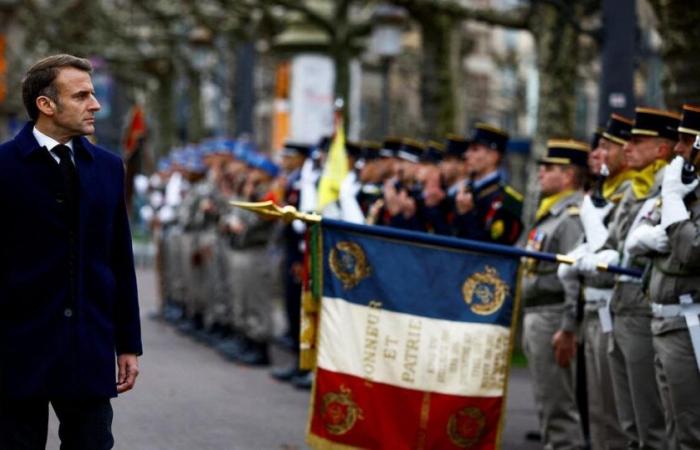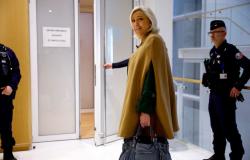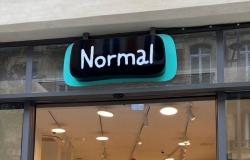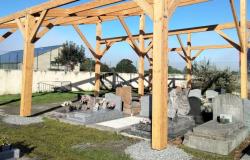The President of the Republic is in Strasbourg, where he is commemorating the 80th anniversary of the city's liberation from the Nazi yoke. He decided to honor the historian and resistance fighter, arrested by the Gestapo and shot three months later in 1944.
Emmanuel Macron announced on Saturday in Strasbourg that the historian and resistance fighter Marc Bloch, “the man of Enlightenment in the army of shadows”assassinated by the Gestapo in 1944, would enter the Pantheon. “For his work, his teaching and his courage, we decide that Marc Bloch will enter the Pantheon”declared the Head of State on the occasion of the 80th anniversary of the Liberation of Strasbourg on November 23, 1944.
Emmanuel Macron commemorates this Saturday the 80th anniversary of the liberation of Strasbourg from the Nazi yoke with a tribute to the Alsatian resistance and those forcibly incorporated. The Head of State, who is continuing a long memorial cycle around the 80th anniversary of the Liberation of France and the end of the Second World War, arrived around 11:45 a.m. at Place Broglie for a military ceremony. He reviewed the troops and bowed to the monument dedicated to General Leclerc.
The strange defeat
Arrested by the Gestapo and shot three months later in 1944, Marc Bloch was a figure of the French resistance. At the end of his speech, Emmanuel Macron will also present the Legion of Honor to his son Daniel Bloch. Professor of Middle Ages history at the University of Strasbourg from 1919 to 1936, Marc Bloch profoundly renewed the field of historical research by extending it to sociology, geography, psychology and economics.
Also read
80 years of D-Day: Emmanuel Macron kicks off his intense memorial journey
In 1929, he notably founded with Lucien Febvre the review of “Annals of economic and social history”which had an academic resonance throughout the world. Captain and Croix de Guerre in 1914-1918, mobilized again in 1939, Marc Bloch joined the resistance at the turn of 1942/43. The author of The strange defeat written in 1940 and published after the war, was arrested in Lyon on March 8, 1944, imprisoned and tortured in Montluc prison, then shot on June 16 with 29 of his comrades.
”
data-script=”https://static.lefigaro.fr/widget-video/short-ttl/video/index.js”
>
Visit to the Natzweiler-Struthof concentration camp
Place Broglie, Emmanuel Macron saluted the memory of General Leclerc and the men of the Second Armored Division, liberators of Strasbourg on November 23, 1944, after having sworn three years earlier during the oath of Koufra (Libya) to fight until for the French flag to fly over the capital of Alsace. “When we knew that the flag was on the cathedral, we had achieved our goal, freedom, to liberate Alsace, a province dear to the heart of the 2nd DB”testified to journalists Roger Le Neures, 101 years old, volunteer resistance fighter in the Free French Forces (FFL) and the 2nd DB, present on site. In a wink, the colors of France will once again be raised on the spire of Strasbourg Cathedral during the ceremony.
SARAH MEYSSONNIER / AFP
Also read
80 years of the liberation of Paris: Louis Michard, a French hero
The Head of State will then go about sixty kilometers from Strasbourg, to the former Nazi concentration camp of Natzweiler-Struthof, the only one erected on French territory when Alsace was de facto annexed by the Third Reich. . Emmanuel Macron will rekindle the flame at the foot of the Memorial to the heroes and martyrs of the deportation, after a “sober and solemn visit” from the Nazi camp. Of the 50,000 prisoners interned at Struthof or its annexed camps, 17,000 died or disappeared. The Head of State will also visit the Alsace-Moselle Memorial Museum in Schirmeck, which traces the history of the region's inhabitants, tossed between France and Germany for decades between 1870 and 1945, and pays tribute to the 36,000 Alsatians and Mosellans who died during the war.
The taboo of “Despite us”
Emmanuel Macron will then speak at the University Palace in Strasbourg. “This will be an opportunity to discuss the resistance of the Alsatians, the liberation of the territory and the always delicate subject of the forcibly incorporated people of Alsace-Moselle” in the Wehrmacht, indicated the Élysée. More than 130,000 Alsatians and Mosellans, considered German after the annexation of these territories, had to integrate the German army, a tragedy which remains painful in the region, 80 years after the end of the war.
Also read
The 80th anniversary of the Liberation honored by the parade
The incorporation of force is “something that has always been misunderstood”declared Jean-Marie Hostert, 99 years old, one of these “Despite us”. “We didn’t want to go there”explains the nonagenarian, present Saturday for the commemorations. For a very long time, the “Despite us”associated for some with one of the worst massacres of civilians committed by the Nazis in Western Europe in Oradour-sur-Glane (Haute-Vienne) in 1944, have remained a relatively taboo subject.
“After the war, we will above all promote heroic, resistant memory, everything that can rebuild the cement of France. And in all this history, the 'Despite us', it's a bit of a stain, it's not glorious, it doesn't allow us to build a memory that will be national”points out historian Christophe Woehrle. “80 years later, we must put words and actions, we must move away from feelings” of shame and “non-recognition”recently estimated the mayor of Strasbourg Jeanne Barseghian.






